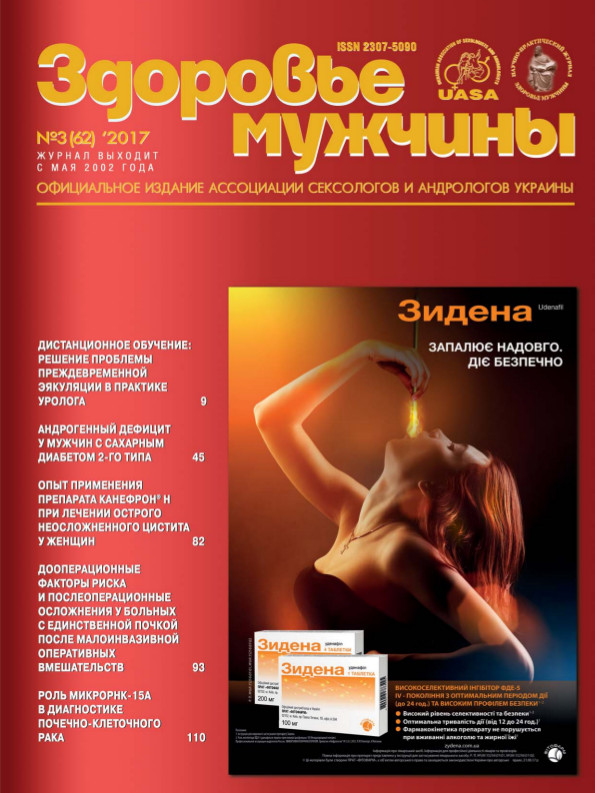Sexual dysfunction in patients with testicular germ cell tumors after treatment
##plugins.themes.bootstrap3.article.main##
Abstract
##plugins.themes.bootstrap3.article.details##

This work is licensed under a Creative Commons Attribution 4.0 International License.
Authors retain the copyright and grant the journal the first publication of original scientific articles under the Creative Commons Attribution 4.0 International License, which allows others to distribute work with acknowledgment of authorship and first publication in this journal.
References
Heidenreich A. Quality-of-life issues in the treatment of testicular cancer / А. Heidenreich, R.Hofmann // World J Urol. – 1999. – 17(4). – P. 230–8.
Jonker-Pool G. Sexual functioning after treatment for testicular cancer – Review and meta-analysis of 36 empirical studies between 1975–2000 / G. Jonker-Pool [et al.] // Archives of Sexual Behavior. – 2001. – 30 (1). – P. 55–74.
Jonker-Pool G. Sexual functioning after treatment for testicular cancer comparison of treatment modalities / G. Jonker-Pool, J. van Basten, H. Hoekstra [et al.] // Cancer. – 1997. – 80 (3). – P. 454–64.
Schover L. Sexual dysfunction and infertility as late effects of cancer treatment / L. Schover, M. van der Kaaij, E. van Dorst [et al.] // EJC Suppl. – 2014. – 12 (1). – P. 41–53.
Haugnes H. Cardiovascular risk factors and morbidity in long-term survivors of testicular cancer: a 20-year follow-up study / H. Haugnes, T. Haugnes, N. Aass [et al.] // J Clin Oncol. – 2010.
– 28 (30). – P. 4649–57.
Fung C. Cardiovascular Disease Mortality After Chemotherapy or Surgery for Testicular Nonseminoma: A Population-Based Study / C. Fung, S. Fossa, M. Milano [et al.] // J Clin Oncol. – 2015. – 33 (28). – P. 3105–15.
Oleary MP. A Brief Male Sexual Function Inventory for Urology / M.P.Oleary [et al.] // Urology. – 1995. – 46 (5). – P. 697–706.
Tuncel A. Relationship between IIEF score, erection hardness score and beck depression index in the evaluation of erectile dysfunction / A. Tuncel [et al.] // Journal of Sexual Medicine. – 2008. – 5. – P. 108–108.
Seidman SN. Exploring the relationship between depression and erectile dysfunction in aging men / SN.Seidman // Journal of Clinical Psychiatry. – 2002. – 63. – P. 5–12.
Incrocci L. Treatment outcome, body image, and sexual functioning after orchiectomy and radiotherapy for Stage I-II testicular seminoma / L. Incrocci, W. Hop, A. Wijnmaalen [et al.] // Int J Radiat Oncol Biol Phys. – 2002. – 53(5). – P. 1165–73.
Glendenning J. Long-term neurologic and peripheral vascular toxicity after chemotherapy treatment of testicular cancer / J. Glendenning, Y. Barbachano, A. Norman [et al.] // Cancer. – 2010. – 116 (10). – P. 2322–31.
Wortel R. Orchiectomy and radiotherapy for stage I-II testicular seminoma: a prospective evaluation of short-term effects on body image and sexual function / R. Wortel, G. Alemayehu, L. Incrocci // J Sex Med. – 2015. – 12 (1). – P. 210–8.
Arai Y. Sexuality and fertility in long-term survivors of testicular cancer / Y. Arai // J Clin Oncol. – 1997. – 15 (4). – P. 1444–8.
Rossen P. Sexuality and body image in long-term survivors of testicular cancer / P. Rossen, A. Pedersen, R. Zachariae [et al.] // Eur J Cancer. – 2012. – 48 (4). – P. 571–8.
Capogrosso P. Long-term recovery of normal sexual function in testicular cancer survivors / P. Capogrosso, L. Boeri, M. Ferrari [et al.] // Asian J Androl. – 2014. – 18 (1). – P. 85–9.
Tal R. Erectile dysfunction in men treated for testicular cancer / R. Tal, D. Stember, N. Logmanieh [et al.] // BJU Int. – 2014. – 113 (6). – P. 907–10.
Bussen S. Semen parameters in patients with unilateral testicular cancer compared to patients with other malignancies / S. Bussen, M. Sьtterlin, T. Steck [et al.] // Arch Gynecol Obstet. – 2004. – 269(3). – P. 196–8.
Raman J. Increased incidence of testicular cancer in men presenting with infertility and abnormal semen analysis / J. Raman, C. Nobert // J Urol. – 2005. – 174 (5). – P. 1819–22.





